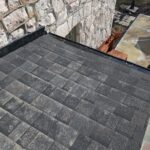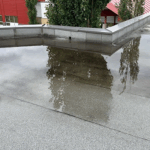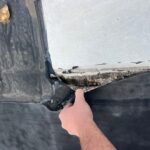How to Make a Successful Roofing Insurance Claim
Roofing damage is a common concern for homeowners, particularly in regions like Asheville, NC, where storms and heavy weather can wreak havoc on roofing materials.
Filing an insurance claim for roof damage can be a complex process, but understanding the steps involved can increase the likelihood of a successful outcome.
This guide provides a detailed breakdown of the process, expert tips, and key considerations to help you secure the coverage you deserve.
Key Takeaways
💡Proper Documentation is Essential for a Successful Roofing Insurance Claim
💡Working with a Professional Roofing Contractor Can Strengthen Your Claim
💡Understanding Your Insurance Policy is Key
💡Persistence and Strategic Negotiation Can Improve Claim Outcomes

Understanding the Insurance Claim Process
Roofing insurance claims typically arise from unexpected events such as storms, falling trees, or other hazards that result in damage to the roof. Homeowner’s insurance policies often cover roof repairs or replacements, but the process to file a claim and obtain compensation requires thorough documentation and adherence to certain procedures.
The steps involved in filing a roofing insurance claim are as follows:
1. Assess the Damage
After a storm or damaging event, it’s crucial to assess the extent of the damage. However, safety should be a priority—avoid climbing onto the roof yourself if the damage is severe or hazardous. Instead, hire a professional roofing contractor to conduct a comprehensive inspection.
2. Review Your Insurance Policy
Understanding the specifics of your homeowner’s insurance policy is essential. Policies vary widely in terms of coverage, deductibles, and exclusions. Know what is covered, what constitutes a covered peril, and what your deductible is.
3. Document the Damage
Take photos and videos of the damage before any temporary repairs are made. Proper documentation can significantly affect the outcome of your claim.
4. Contact Your Insurance Company
Notify your insurance company of the damage as soon as possible. This starts the claim process and allows them to assign an adjuster to assess the situation.
5. Get a Professional Roofing Estimate
Having a detailed roofing estimate from a licensed contractor can support your claim. This estimate should include all the necessary repairs or replacement costs.
6. Meet with the Insurance Adjuster
The insurance adjuster will visit your property to evaluate the damage. It is beneficial to have your roofing contractor present during this meeting to ensure that all damages are properly noted.
7. Negotiate if Necessary
Sometimes, the initial claim settlement offer may not cover all the necessary repairs. In this case, you or your contractor may need to negotiate with the insurance company.
8. Approve Repairs and Finalize the Claim
Once you agree on the settlement, the repairs can proceed. Keep all receipts and documentation related to the repairs to finalize the claim.
Common Reasons for Roofing Insurance Claim Denials
Understanding why roofing claims get denied can help avoid pitfalls. The most frequent reasons include:
– Wear and Tear: Insurance policies often exclude coverage for roofs that are old or exhibit wear and tear.
– Improper Maintenance: If the insurance company believes the damage resulted from neglect, your claim may be denied.
– Gradual Deterioration: Damage resulting from gradual wear over time, rather than a sudden event, is typically not covered.
– Policy Exclusions: Certain perils may be excluded from your policy. Understanding these exclusions beforehand is crucial.
Statistics on Roofing Insurance Claims
To give a better perspective, here are some statistics relevant to roofing insurance claims in the U.S.:
| Statistic | Value |
|---|---|
| Average cost of roof repair (U.S.) | $350 - $1,500 |
| Average cost of full roof replacement (U.S.) | $5,000 - $10,000 |
| Percentage of insurance claims for roofing | 30-40% of all home insurance claims |
| Claim success rate with professional assistance | 75-80% |
| Average deductible for roofing claims | $500 - $2,000 |
| Most common cause of roofing claims | Wind and hail damage (70% of claims) |
Pros and Cons of Filing a Roofing Insurance Claim
Filing a roofing insurance claim is not always straightforward, and there are both benefits and drawbacks to consider:
| Pros | Cons |
|---|---|
| Potential for full coverage of repair costs | Risk of premium increase |
| Professional assistance can simplify the process | Time-consuming documentation process |
| Helps ensure quality repairs through vetted contractors | Potential for partial coverage due to exclusions |
| Protects homeowners from significant out-of-pocket costs | Claims may be denied for various reasons |
| Can prevent further damage by allowing timely repairs | Deductibles must be met before insurance kicks in |
How Asheville's Weather Impacts Roofing Claims
Asheville, NC, experiences a range of weather conditions that can affect roofs, including:
– Hailstorms: These can cause significant damage to shingles, leading to water leaks.
– Heavy Rainfall: Constant exposure to rain can erode roofing materials and lead to moisture damage.
– High Winds: Wind damage can cause shingles to lift or blow off, exposing the roof deck.
The local weather patterns make it especially important for Asheville homeowners to conduct regular roof inspections and maintain proper roofing care to prevent potential damage.
Tips for a Successful Roofing Insurance Claim
To maximize the chances of a successful roofing insurance claim, consider the following expert tips:
1. Work with a Reputable Roofing Contractor
A reputable local contractor will know the specific requirements and common issues with roofing claims in Asheville. They can help provide the necessary documentation and be present during the adjuster’s inspection.
2. Thoroughly Document All Communications
Keep a record of all communications with your insurance company and contractor, including emails, phone calls, and written correspondence.
3. Consider a Public Adjuster if Your Claim is Denied
If you face a claim denial, a public adjuster can help reassess the damages and negotiate with the insurance company on your behalf.
4. Be Persistent
Sometimes, obtaining approval for a roofing claim requires persistence. Don’t hesitate to appeal a denied claim if you believe the damage is covered under your policy.
5. Understand the Depreciation Factor
Many insurance policies factor in depreciation, which can affect the payout. Understanding this ahead of time can help you negotiate a better settlement.
FAQs about Successful Roofing Insurance Claims
Most homeowners' insurance policies cover sudden and accidental damages, such as those caused by storms, falling trees, or fire. Routine maintenance and wear and tear are not covered.
Quickly document the damage, notify your insurance company, and get a professional inspection. Having all the necessary information ready can help expedite the process.
It is possible, especially if you live in a high-risk area or file multiple claims. However, this varies by insurance company and policy.
You can appeal the decision, provide additional evidence, or hire a public adjuster to reassess the damage.
While you can choose any licensed contractor, it's best to select one familiar with insurance claim procedures.
Yes, older roofs may be subject to depreciation, reducing the payout.
ACV policies cover the roof's current value, considering depreciation, whereas RCV policies cover the cost to replace the roof with a similar one without considering depreciation.
Yes, regular maintenance can prevent damage and help avoid claim denials due to negligence.
It is the amount you pay out-of-pocket before your insurance covers the remaining costs.
Yes, a second opinion can provide a more accurate estimate, especially if there are discrepancies.
Making Successful Roofing Insurance Claims
Filing a roofing insurance claim can be a daunting process, but with the right preparation, professional assistance, and understanding of your policy, you can navigate it successfully. Asheville, NC homeowners should remain vigilant about roof maintenance and document any damage promptly. Partnering with a reputable roofing contractor ensures that the claim process goes smoothly and increases the likelihood of securing the necessary coverage for repairs.





